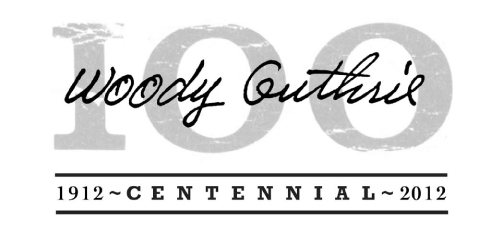Billy Bragg: ‘Woody’s alt. credentials were underlined by his determination to write about the lives of ordinary working people and to oppose racial discrimination.’A Woody Guthrie Centennial Moment:
‘Woody Was The Original Alternative Musician’
Billy Bragg on Woody Guthrie, the ‘Mermaid Avenue’ albums, and his tour celebrating the Woody Guthrie Centenary
On the acclaimed Mermaid Avenue albums, Billy Bragg and Wilco put music to lyrics by folk legend Woody Guthrie for which he had not written music or made recordings. To commemorate the 100th anniversary of Woody's birth, Nonesuch Records released Mermaid Avenue: The Complete Sessions, a four disc set, comprising the original two volumes; a third volume with 17 previously unreleased recordings from those sessions; the 1999 documentary on the sessions, Man in the Sand; and a 48-page booklet with new liner notes by Nora Guthrie, lyrics, archival photographs, and facsimiles of lyric sheets and sketches by Woody Guthrie.
Billy Bragg has launched a spring and summer tour of Europe and North America in celebration of the life and legacy of Woody Guthrie, on the 100th anniversary of folk legend's birth. Bragg is currently performing in Europe, then brings the Ain't Nobody That Can Sing Like Me tour to the States in June and July, and returns to the UK to hit the summer festivals. He has now added four specially curated acoustic shows in the UK and Ireland this September, with guests Joe Henry, KT Tunstall, Andy Irvine, Martyn Joseph, and Grace Petrie joining him along the way. For details on these and all of the currently scheduled tour dates with ticket links, go to nonesuch.com/on-tour.
Here, in his own words, Billy Bragg shares his thoughts on this momentous centenary, the Mermaid Avenue project, and the concerts:
Born on 14th July 1912 in Okemah, Oklahoma, Woody Guthrie was one of the most influential figures in popular music, inspiring Bob Dylan and a generation of topical singer-songwriters in the 1960s and even having an influence on punk--Joe Strummer modeled himself on Guthrie, asking friends to call him Woody as a teenager.
Guthrie was the original alternative musician. His most famous song “This Land is Your Land” was written in 1940 as a response to the number one hit of the day, Irving Berlin's patriotic hymn “God Bless America.” His alt. credentials were underlined by his determination to write about the lives of ordinary working people and to oppose racial discrimination. On his guitar he painted the words "This machine kills fascists."
Billy Bragg and Wilco, ‘California Stars,’ from Mermaid AvenueWoody's career as a musician can be divided into two phases. The first western phase saw him living in Oklahoma, Texas, and California during the Great Depression. It was during this period that he composed his most famous songs, mostly dealing with the problems faced by farm laborers forced off of the land by dust storms and bailiffs, migrating to California to seek seasonal work as fruit pickers.
The second phase of his career began in 1940, when he moved to New York City. Here he recorded his dust bowl ballads and hooked up with musicians such as Pete Seeger and Lead Belly. New York inspired him to new heights of songwriting, but most of the material he composed in the '40s was never recorded, as topical songwriters became suspect in an America that was undergoing a communist witch-hunt.
Billy Bragg and Wilco, ‘Walt Whitman’s Niece,’ from Mermaid AvenueBy the end of that decade, Woody was beginning to experience the early symptoms of Huntington Disease, a degenerative condition of the nervous system for which there is no cure. By the mid-50s, he was no longer able to perform and spent the rest of his life in hospitals. When he died in 1967, he left thousands of unrecorded songs in manuscript form. What he didn't leave behind were the tunes. Like myself, Woody couldn't write musical notation. When he wrote a song, he kept the tune in his head. As a result, when he died, the tunes for the songs which he hadn't had time to record were lost forever. And there were thousands of them. It's estimated Woody only managed to record 10% of the songs he wrote in his lifetime.
It was this treasure trove of songs that Nora Guthrie discovered when she founded the Woody Guthrie Archives in the early 1990s. She'd always known that they were there, in boxes at her mother's house while she was growing up, but she never realized how many there were and how varied their subject matter.
Nora was concerned that over the years her father had become a two-dimensional figure, known only for “This Land Is Your Land” and his influence on Bob Dylan. The unrecorded songs, she felt, offered us a three-dimensional vision of her father as more than just a dust bowl balladeer. She was determined to bring these songs to a greater audience.
Supersonic Boogie: ‘All You Fascists,’ Billy Bragg and Wilco, from Mermaid AvenueI first met Nora in July 1992, at a concert in Central Park, New York, to commemorate Woody's 80th birthday. She began sending me lyrics of her father's unrecorded songs, encouraging me to write new music and make a collaborative album. Her initiative finally bore fruit in 1997, when I got together with Wilco in Chicago and Dublin, where we recorded nearly 50 “new” Woody Guthrie songs.
Nora helped me to overcome my initial feelings of being daunted by taking on this huge icon because she had already worked out what she wanted to do and that was, ‘The legend is over there and we’re going over here where everything is unknown. So everything you know about Woody, forget.’
Because the songs came from Guthrie’s later years the slate was clean on arrangements. A liner scribble about tempo on one of the lyrics was a breakthrough. It reads, “supersonic boogie.”
Billy Bragg and Wilco, ‘Against Th’ Law,’ from Mermaid AvenueI don’t think this is a job for a Guthrie obsessive because if you were, you’d ignore “supersonic boogie” as an aberration because it only occurs once. You need to be someone like Nora who can say, “Go forward with this, don’t be hidebound.”
Woody came from the English folk-song tradition, songs of 30 verses and no reprise. It helped to know that because it gave me my parameters. At one end you had that Elizabethan ballad tradition, at the other “supersonic boogie” and everything in between is permissible.
I would argue he’s the last of that ballad tradition and on the cusp of where folk music stops being folk and became music where people know who wrote it. He was the first singer-songwriter.
Woody was an urban character and previous to this project most of us would envisage him as a bit player in the film Grapes of Wrath. I have to tell you the same man could justifiably be a bit player in On the Town when Frank Sinatra and Gene Kelly go to New York in 1949 and end up in Coney lsland--where Woody lived.
‘Another Man’s Done Gone,’ from Mermaid Avenue: ‘…in that one moment we reached back to the man himself and kept the faith with him, with Marjorie his wife who kept the lyrics, with Nora who set up the archive…,’ says Billy Bragg(The song on the album Bragg is most proud of is one Tweedy sings, a 90-second “Another Man’s Done Gone” spontaneously recorded late at night with just piano backing.)
That is the key lyric on the album and we were reaching back and affirming what he wrote when he didn’t have a deal or a career, just had a family, and was aware he was dying, yet felt in some way what he was doing would last.
Our job was to take the idea forward, but in that one moment we reached back to the man himself and kept the faith with him, with Marjorie his wife who kept the lyrics, with Nora who set up the archive . . .
Billy Bragg and Wilco, ‘Ingrid Bergman,’ from Mermaid AvenueBy recording that and locking in to that particular emotion l felt we underscored the entire project with his lyric, ‘But I feel like this scribbling will stay.’
And nobody would have thought if you added Billy Bragg to Woody Guthrie you would have ended up with Mermaid Avenue and I’m happy with that.
I feel I’ve overcome expectations about myself and Woody--and he hasn’t made his last record; this is just the first for 50 years.
The first collection of those songs, Mermaid Avenue--named for the street in Coney Island where Woody lived with his family--was released in 1998. A second collection, Mermaid Avenue Volume II, was released in 2000. Both albums were nominated for Grammy awards.
Woody Guthrie, ‘Jesus Christ’ (1940), a variation on ‘The Ballad of Jesse James’To commemorate the 100th anniversary of Woody's birth, Nonesuch Records has released Mermaid Avenue: The Complete Sessions, a four disc set, comprising Volumes I and II as well as a new collection of 17 songs from the original sessions, Mermaid Avenue Volume III. The fourth disc contains Man in the Sand, Kim Hopkins' 1999 film, which documents the collaboration between Woody, Wilco and me.
The shows in September will also form part of this year of celebration. I'll be playing acoustic instruments and singing from the book of lyrics which I compiled from the archives and used during the sessions, quoting from Woody's handwritten notes that are often tagged onto the manuscripts. I have recruited some friends to join me at the shows to add their voices and interpretations to the ever evolving and continually relevant words and work of Woodrow Wilson Guthrie.
Posted May 30, 2012 at the Nonesuch Records website, with additional content from an excellent piece on Bragg and the first Mermaid Avenue album by Graham Reid posted on his website, Elsewhere.
Mermaid Avenue: The Complete Sessions by Billy Bragg and Wilco is available at www.amazon.com
Founder/Publisher/Editor: David McGee
Contributing Editors: Billy Altman, Laura Fissinger, Christopher Hill, Derk Richardson
Logo Design: John Mendelsohn (www.johnmendelsohn.com)
Website Design: Kieran McGee (www.kieranmcgee.com)
Staff Photographers: Audrey Harrod (Louisville, KY; www.flickr.com/audreyharrod), Alicia Zappier (New York)
E-mail: [email protected]
Mailing Address: David McGee, 201 W. 85 St.—5B, New York, NY 10024




